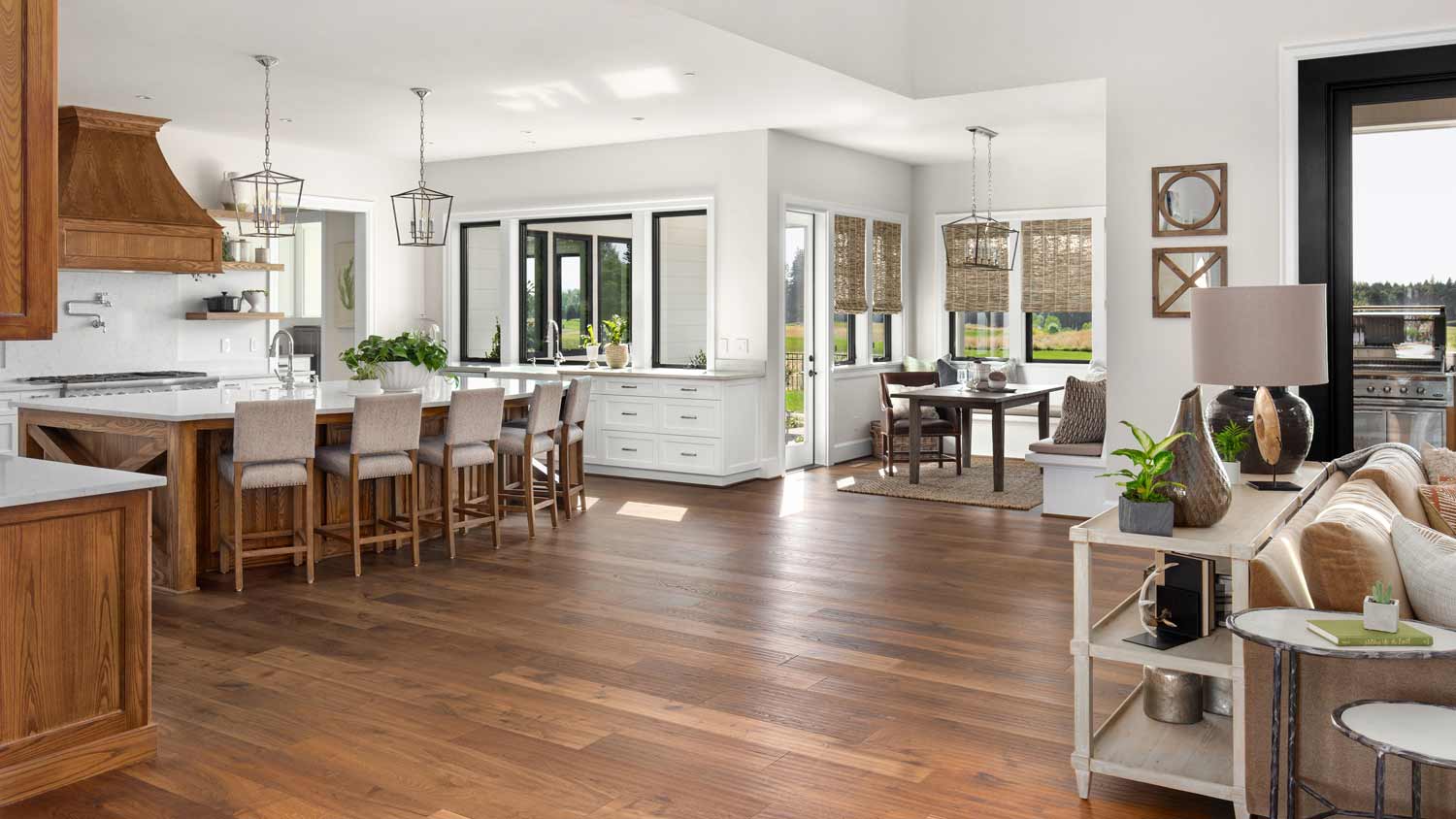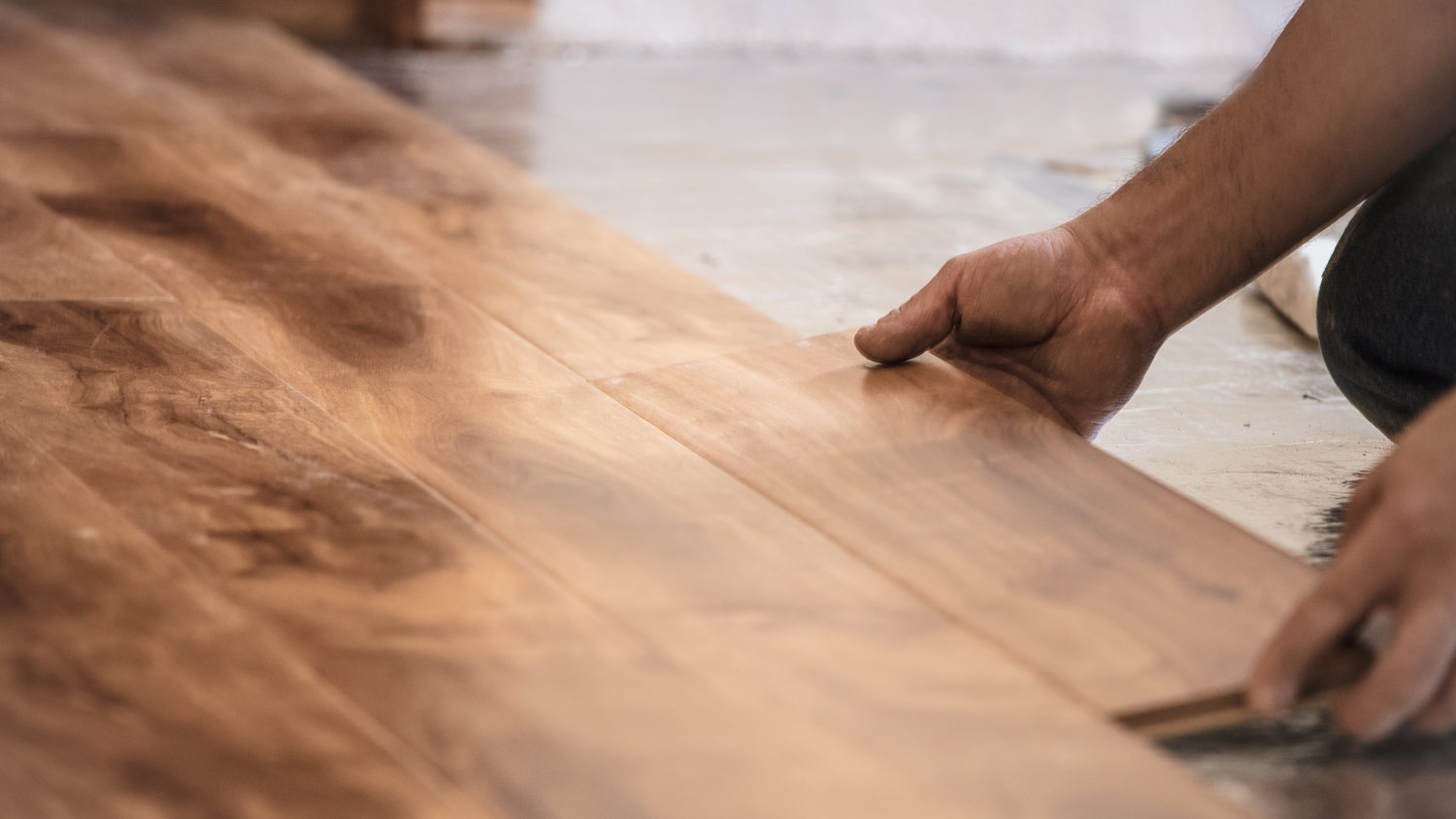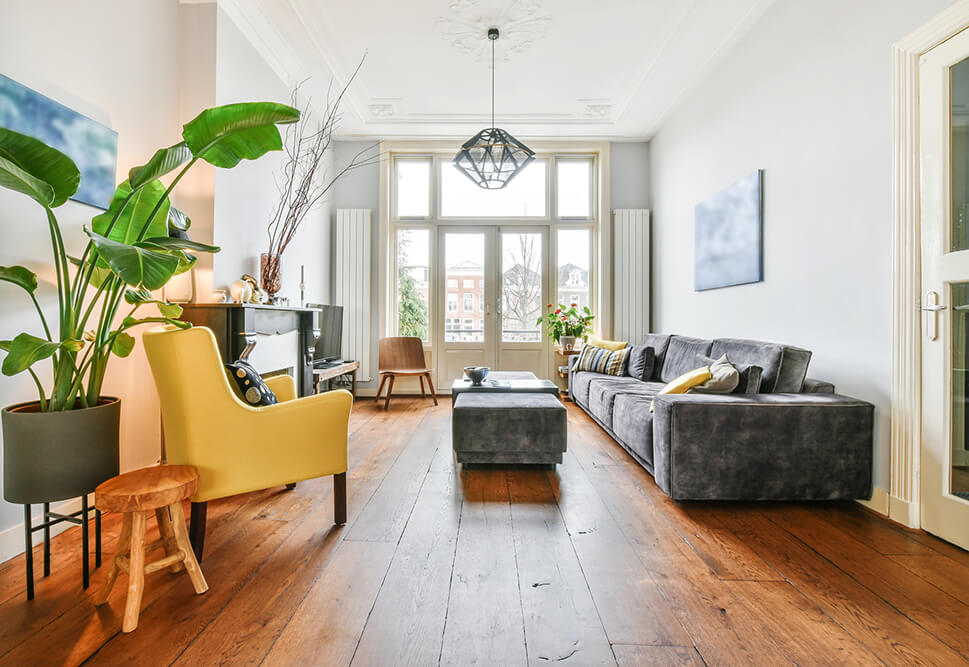How Much Do Hardwood Floor Repairs Cost? [2025 Data]
The average hardwood floor repair costs $1,072, but it can range between $480 and $1,706. A pro will determine the exact cost depending on materials, damage, and size.


Minor scratches need simple touch-ups, but water damage or rot requires extensive board replacement and subfloor work.
New floorboards must match the exact type, size, and thickness of existing boards, which often makes replacement expensive.
Professional repairs cost between $65 and $100 per hour, with complex jobs requiring specialized skills and equipment.
Simple repairs like filling can be DIY, but complex methods like resurfacing require professional expertise to avoid further damage.
The average hardwood floor repair cost is $1,072, though most homeowners spend between $480 and $1,706. Costs heavily depend on the extent of the damage and the repair method. Use this guide to learn all about hardwood floor repairs based on factors like the type of problem, repair method, and whether or not you hire a pro to fix it.
Hardwood Floor Repair Cost Factors
Several factors affect the cost of repairing a hardwood floor, including the size and type of problem you’re addressing. The fix method can also affect your costs.
Type of Problem
The type of problem you’re fixing significantly affects how much you’ll pay for repairs. For instance, fixing minor scratches might only cost $1 per square foot, while repairing water damage can cost as much as $100 per square foot.
| Type of Problem | Average Cost per Square Foot |
|---|---|
| Uneven | $3–$60 |
| Scratches | $1–$8 |
| Cupping | $1–$8 |
| Mold and mildew | $10–$25 |
| Gaps | $7–$15 |
| Water damage | $8–$100 |
| Squeaky | $10–$50 |
| Rot | $50–$250 |
| Dents | $5–$25 |
Uneven Hardwood Floors: Repairing uneven floors typically ranges from $3 to $60 per square foot, depending on the cause. Common causes include excess moisture, foundation shifting, and poor structural design.
Hardwood Floor Scratches: Scratches normally cost between $1 and $8 per square foot to fix. Minor scratches only require inexpensive wood stain or touch-up markers, but deeper scratches involve sanding and refinishing the area, which costs more.
Hardwood Floor Cupping: Cupping refers to hardwood floors higher around the edges than the center, creating a cup-like effect. It’s often caused by a moisture imbalance. Cupping repairs cost between $1 and $8 per square foot.
Mold and Mildew: Removing mold and mildew costs between $10 and $25 per square foot, depending on the extent of the damage. If your mold problem is severe, you may need to replace whole sections of the floor or subfloor, which can significantly increase your costs.
Hardwood Floor Gaps: Commonly caused by fluctuating humidity levels, hardwood floor gaps cost between $7 and $15 per square foot to fix.
Water Damage: Repairing water damage can cost anywhere from $8 to $100 per square foot, depending on the severity. Water damage can cause problems like warping, staining, and mold.
Squeaky Hardwood Floors: Squeaky floors are often caused by gaps between the subfloor and joists or loose boards. Fixing them normally costs between $10 and $50 per square foot.
Rotted Hardwood Floors: If your floors are exposed to moisture for too long, the wood can begin to rot, leading to decay and weakness. Fixing rotted floors ranges from $50 to $250 per square foot.
Dented Hardwood Floors: If you drop something heavy on the floor or move heavy furniture, it can leave a dent. Fixing dented hardwood floors costs between $5 and $25 per square foot.
Cost per Square Foot
Generally, the bigger your hardwood floor damage, the more you can expect to pay, since costs are often priced by the square foot.
| Square Feet | Price Range |
|---|---|
| 20 | $100–$500 |
| 50 | $250–$1,250 |
| 100 | $500–$2,500 |
| 150 | $750–$3,750 |
| 200 | $1,000–$5,000 |
| 300 | $1,500–$7,500 |
| 400 | $2,000–$9,500 |
Type of Wood Floor
The type of hardwood you have affects repair costs since different wood species vary in price, availability, and difficulty to work with. More expensive and exotic wood types like Brazilian walnut often cost more to repair because replacement boards are pricier and harder to find.
| Wood Type | Average Repair Cost per Sq. Ft. |
|---|---|
| Maple | $4–$15 |
| Red Oak | $5–$11 |
| White Oak | $5–$12 |
| Hickory | $6–$14 |
| White Ash | $6–$14 |
| Brazilian Walnut | $9–$15 |
Hardwood Floor Repair Costs by Method

Different problems require different repair methods. The method needed can affect your costs since some methods are more expensive and time-consuming than others.
| Repair Method | Cost Range |
|---|---|
| Filling | $10–$15 |
| Polishing | $100–$300 |
| Patching | $600–$1,600 |
| Floorboard Replacements | $800–$2,000 |
| Refinishing | $1,100–$2,700 |
| Resurfacing | $1,200–$3,000 |
Filling: Filling involves using a putty-like wood filler to fill minor cracks, gaps, and holes, costing around $10 to $15 for the package. Most homeowners can complete this DIY repair by applying filler, smoothing it out, letting it dry, and sanding the area smooth.
Polishing: Polishing costs between $100 and $300 and helps restore shine to floors in good condition that have lost their luster. The process involves applying specialized polish or buffing compound to smooth out minor scratches and restore the floor's original appearance.
Patching: Patching usually costs between $600 and $1,600, depending on the size of the problem area. This process involves cutting out damaged sections and replacing them with new wood pieces that are sanded and finished to blend with existing flooring.
Floorboard Replacements: Replacing floorboards normally costs between $800 and $2,000 since new boards must match the exact type, size, and thickness of existing boards.
Refinishing: You can expect to pay anywhere from $1,100 to $2,700 to refinish your hardwood floors. This method is used for extensive surface-level damage like scratches and dents.
Resurfacing: Resurfacing costs between $1,200 and $3,000 and addresses deeper damage than refinishing can handle. The process involves deep sanding to remove damaged layers and applying multiple finish coats.
Labor
Hiring a local hardwood repair pro usually costs between $65 and $100 per hour. Depending on the damage they're addressing, the repairs can take anywhere from an hour or two to multiple days to complete. Most homeowners end up paying somewhere between $330 and $2,400 in labor for hardwood floor fixes.
Cost of Common Hardwood Floor Repair Add-Ons
When repairing a hardwood floor, you may want to book other services to further enhance or restore your home’s appearance.
Interior painting cost: $1,000-$3,000
Air duct cleaning cost: $270-$500
Protective floor pads cost: $5-$15
Deep home cleaning cost: $200-$400
Hardwood Floor Repair vs. Replacement
In many cases, repairing your hardwood floors makes more sense than replacing them. Minor issues like scratches, gaps, or squeaks can often be fixed without tearing up your entire floor.
However, replacement becomes necessary when your floors have extensive water damage, severe rot throughout multiple boards, or structural issues that affect the subfloor. If the damage covers most of your floor area or the wood has deteriorated beyond surface-level problems, replacement may be your only option.
DIY Hardwood Floor Repair vs. Hiring a Pro
Hiring a pro to fix your hardwood floor can cost anywhere from $330 to $2,400 in labor, depending on the problem. Many homeowners can save money on a hardwood installation pro by conducting minor repairs themselves, like filling cracks. But it’s best to leave more complex repairs, like resurfacing and floorboard replacements, to the pros unless you have some related experience under your belt. Otherwise, you run the risk of creating further damage. A hardwood floor professional will have the skills, knowledge, and equipment necessary to safely and properly repair your floor.
How to Save Money on Hardwood Floor Repairs
There are several ways you can potentially save money on a hardwood floor repair, including:
Completing minor repairs yourself
Calling multiple prospective repair pros to find the best price
Bundling multiple repairs together for a potential discount
Doing prep work yourself, like moving furniture
Scheduling repairs during off-peak seasons, like winter
Shopping around for materials to find the best price
Using reclaimed or leftover materials
How Angi Gets Its Cost Data
Home is the most important place on earth, which is why Angi has helped more than 150 million homeowners transform their houses into homes they adore. To help homeowners with their next project, Angi provides readers with the most accurate cost data and upholds strict editorial standards. We’ve surveyed thousands of real Angi customers about their project costs to develop the pricing data you see, so you can make the best decisions for you and your home. We pair this data with research from reputable sources, including the U.S. Bureau of Labor Statistics, academic journals, market studies, and interviews with industry experts—all to ensure our prices reflect real-world projects.
Want to help us improve our cost data? Send us a recent project quote to [email protected]. Quotes and personal information will not be shared publicly.
Yes, you can fix hardwood floor gouges. Apply wood filler to shallow gaps, smooth it, sand it, and match the stain. For deeper gouges, layer the filler. However, remember that you may need to repeat this process annually. Wood expands and shrinks throughout the year, loosening the wood filler.
To remove deep scratches from hardwood without sanding, start by cleaning the area. Then, fill the scratch with wood filler or a wax repair stick matching the floor color. Buff it smooth with a soft cloth. Finish with a protective sealant to blend the repair with the surrounding wood. Remember, this type of fix is not permanent. It is a better idea to refinish your floors for lasting results.
Keep your floors clean by sweeping or vacuuming them weekly to remove dirt and debris that can scratch the surface. Mats at entryways are also a good idea to catch excess dirt and moisture before it reaches the floors. Additionally, pads under furniture legs will help protect your floors from scratches.
Furniture pads and rugs are simple ways to protect your floors as they prevent furniture from scratching them, reducing wear and tear. The same goes for trimming your pet’s nails since they can scratch the floors as well. You can also apply a protective finish every few years to maintain the floor’s appearance.














